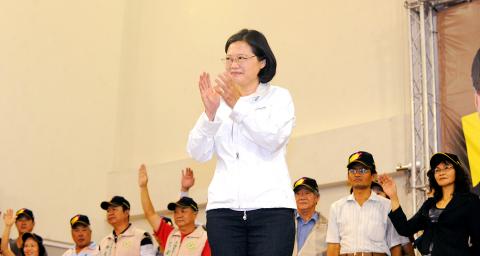Democratic Progressive Party (DPP) presidential candidate Tsai Ing-wen (蔡英文) is working hard and looking forward to the first of three crucial TV presidential debates, which will be held on Saturday.
With recent public opinion polls showing Tsai has overtaken President Ma Ying-jeou (馬英九), who is seeking re-election, in public support, Tsai will seek to solidify her lead in the presidential race with strong performances in the debates.
Candidates representing the Chinese Nationalist Party (KMT), the DPP and the People First Party (PFP) will take part in the debates, which will take place on Saturday, Dec. 10 and Dec. 17, and will be hosted by the Central News Agency and five other media outlets — Public Television Service (PTS), the China Times, the Liberty Times (the Taipei Times’ sister newspaper), the United Daily News and the Apple Daily.

Photo: Huang Chih-yuan, Taipei Times
The first debate will be held from 2pm to 4:30pm on Saturday and will be moderated by the organizing media outlets. The second will be moderated by representatives from NGOs.
The DPP is using Tsai’s speech at the American Chamber of Commerce in Taipei last week to prepare for the debates, as Tsai spoke immediately after Ma on that occasion.
The party said it was pleased with the results.
The debates will be more than just an opportunity to extend Tsai’s lead in the polls, but also an occasion for her to take “revenge” for the first debate between her and Ma last year, in which Ma was widely considered to have bested his opponent.
That debate took place in April last year, and centered on the Economic Cooperation Framework Agreement (ECFA).
While Tsai has long been known for her logic and recognized as an articulate speaker and a “thinker,” most analysts said after the debate that Ma was more successful in appealing to the audience, despite dodging most of Tsai’s questions.
Ma will not be Tsai’s only opponent this time, with PFP Chairman James Soong (宋楚瑜) also entering the debates as the third presidential candidate.
While Soong is expected to focus most of his attacks on Ma, he is unlikely to give Tsai much breathing room.

CHANGING LANDSCAPE: Many of the part-time programs for educators were no longer needed, as many teachers obtain a graduate degree before joining the workforce, experts said Taiwanese universities this year canceled 86 programs, Ministry of Education data showed, with educators attributing the closures to the nation’s low birthrate as well as shifting trends. Fifty-three of the shuttered programs were part-time postgraduate degree programs, about 62 percent of the total, the most in the past five years, the data showed. National Taiwan Normal University (NTNU) discontinued the most part-time master’s programs, at 16: chemistry, life science, earth science, physics, fine arts, music, special education, health promotion and health education, educational psychology and counseling, education, design, Chinese as a second language, library and information sciences, mechatronics engineering, history, physical education

DEADLOCK: As the commission is unable to forum a quorum to review license renewal applications, the channel operators are not at fault and can air past their license date The National Communications Commission (NCC) yesterday said that the Public Television Service (PTS) and 36 other television and radio broadcasters could continue airing, despite the commission’s inability to meet a quorum to review their license renewal applications. The licenses of PTS and the other channels are set to expire between this month and June. The National Communications Commission Organization Act (國家通訊傳播委員會組織法) stipulates that the commission must meet the mandated quorum of four to hold a valid meeting. The seven-member commission currently has only three commissioners. “We have informed the channel operators of the progress we have made in reviewing their license renewal applications, and

The High Prosecutors’ Office yesterday withdrew an appeal against the acquittal of a former bank manager 22 years after his death, marking Taiwan’s first instance of prosecutors rendering posthumous justice to a wrongfully convicted defendant. Chu Ching-en (諸慶恩) — formerly a manager at the Taipei branch of BNP Paribas — was in 1999 accused by Weng Mao-chung (翁茂鍾), then-president of Chia Her Industrial Co, of forging a request for a fixed deposit of US$10 million by I-Hwa Industrial Co, a subsidiary of Chia Her, which was used as collateral. Chu was ruled not guilty in the first trial, but was found guilty

Taiwan People’s Party (TPP) Chairman Huang Kuo-chang (黃國昌) yesterday appealed to the authorities to release former Taipei mayor Ko Wen-je (柯文哲) from pretrial detention amid conflicting reports about his health. The TPP at a news conference on Thursday said that Ko should be released to a hospital for treatment, adding that he has blood in his urine and had spells of pain and nausea followed by vomiting over the past three months. Hsieh Yen-yau (謝炎堯), a retired professor of internal medicine and Ko’s former teacher, said that Ko’s symptoms aligned with gallstones, kidney inflammation and potentially dangerous heart conditions. Ko, charged with